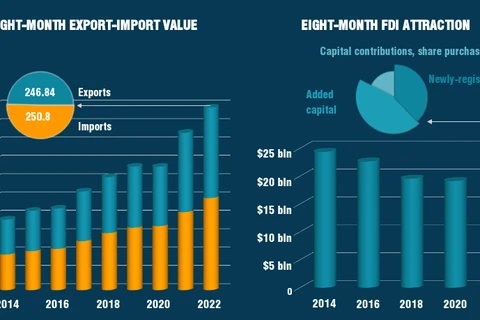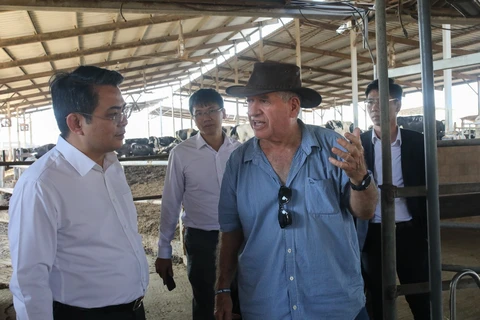Hanoi (VNA)- Vietnam's macroeconomic update report for September 2022 by the World Bank (WB) has just been released, assessing that Vietnam's economy will continue to recover despite high global inflation as well as weakening economic growth in its key trading partner countries.
Industry and retail continue to recover
The World Bank's experts said that industrial production continued to show recovery momentum. Specifically, industrial production and retail sales recorded high growth rates of 15.6% and 50.2%, respectively in comparison to the same period last year.
In which, electronic goods increased by 12% compared to the previous month, means of transport up by 15.7%. The Manufacturing Purchasing Managers' Index (PMI) rose from 51.2% in July to 52.7% in August. This is the 11th consecutive month of growth for the sector.
Retail sales also continued to recover. Specifically, sales of consumer services tripled compared to the same period last year and increased by 3.5% compared to pre-pandemic levels. Sales of accommodation and catering services increased by over 185%, contributing some 50% to growth in sales of consumer services.
In addition, the merchandise trade balance recorded a surplus of 2.4 billion USD in August. Exports in August increased by 22.5% year-on-year, while imports increased by 13.3%.
Regarding foreign direct investment (FDI), although the registered capital slowed down, the disbursed capital continued to be on the rise. Accordingly, the disbursement of FDI capital in August rose by 13.9% over the same period last year, recording a continuous increase trend for 9 months.
Besides, credit growth remained at a high level compared to the same period last year, while the interbank overnight interest rate increased from 0.71% in June to 4.19% in July and 4.42% in August.
Beware of inflation risk
According to a report by the World Bank, consumer price index (CPI) inflation eased slightly from 3.1% in July to 2.9% in August, mainly due to a slowdown in energy prices.
Even so, the recent increase in fuel prices is affecting food and basic commodity prices. Food price inflation inched up slightly, from 3% in July to 3.3% in August (year-on-year).
Core CPI inflation, which excludes food, fuel and government-managed prices, continued to rise from 2.6% in July to 3.1% in August compared to the same period last year.
According to the report, the economic recovery process is going on despite increasing uncertainties in the economy related to higher global inflation and weaker economic growth in the countries which are Vietnam's main trading partner.
Besides the positive factors, the World Bank believes that Vietnam needs to be careful with inflation risks related to food prices and basic commodities. Although fuel prices have cooled recently, global fuel price volatility is unpredictable.
Encouraging the production and use of alternative energy is a way to reduce the economy's dependence on imported fuels and promote green growth, World Bank experts said, noting that the social assistance system needs to be strengthened, including registration, target selection and disbursement systems, to facilitate access to the affected people during the time of shocks.
Vietnam’s Gross Domestic Product (GDP) in the second quarter of this year was estimated to increase 7.72% year-on-year, higher than the growth rates in the same quarters during the 2011-2021 period, the General Statistics Office (GSO) reported at a press conference on June 29.
According to GSO, the country's socio-economic development in the first six months of 2022 has prospered in most industries and fields, especially processing and manufacturing industry; retail sales of consumer goods and services; and exports.
The agriculture-forestry-fishery sector increased 3.02%, contributing 4.56% to the overall growth of the economy.
The industry and construction sector was up 8.87%, making up 46.85%, while the service sector rose by 8.56 percent, contributing 48.59 percent to the general GDP growth, GSO added./.























